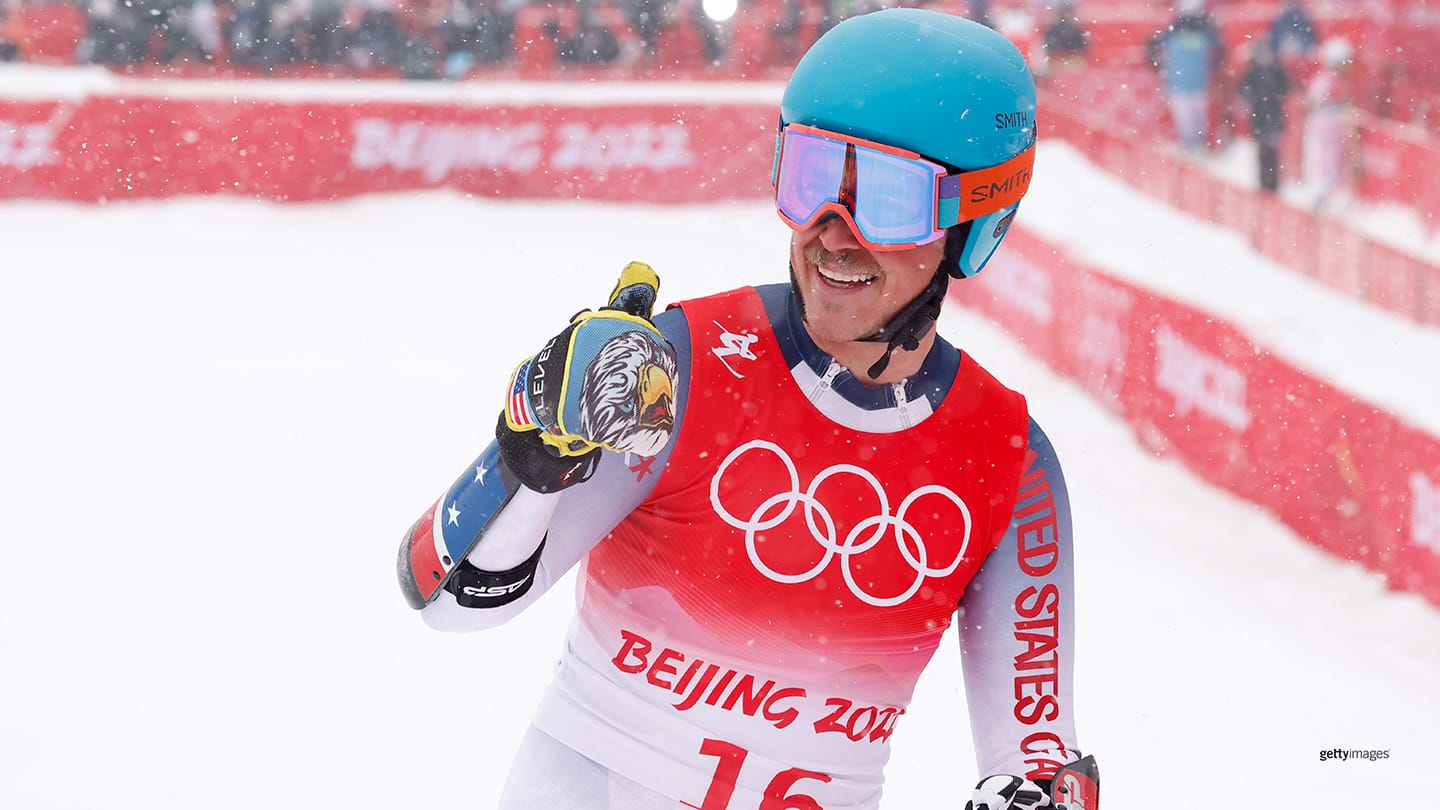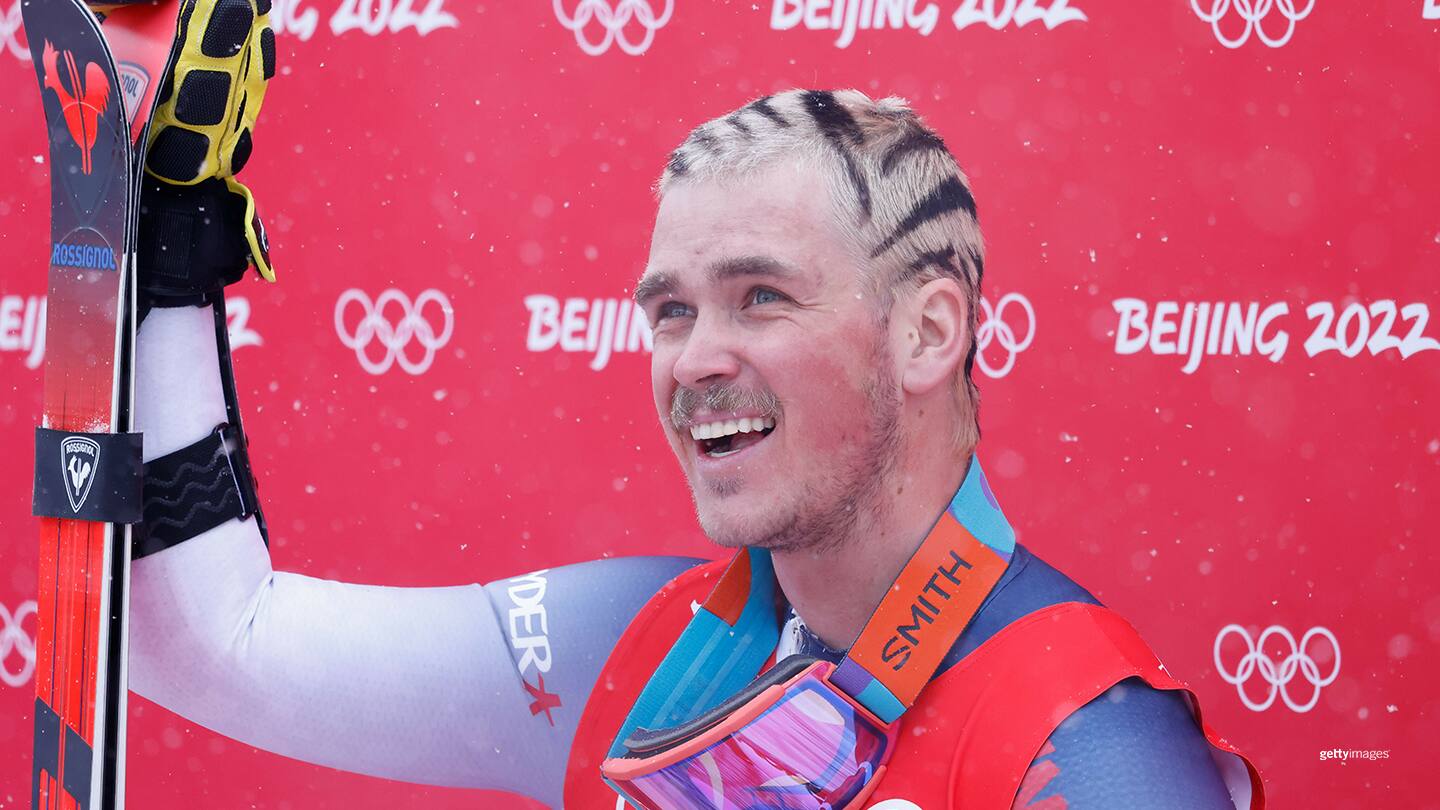
A River Runs Through It: In First Olympics, River Radamus Takes Fourth In Men’s GS
by Peggy Shinn

BEIJING — The giant slalom course at the Olympic Winter Games Beijing 2022 is called the Ice River. And River Radamus did it justice.
As snow fell heavily at the Yanqing National Alpine Skiing Center, covering the course in several inches of fluff, the 24-year-old from Colorado finished fourth in the men’s giant slalom.
“It's pretty cool, it's bittersweet to be sure,” said Radamus, wearing no hat or helmet over his zebra-striped hair. “I'm really proud of my effort. I'm proud of how I performed today. Obviously, you always want more, but I couldn't have expected any more coming into today. So it's really special.”
Hard fought fourth-place finish 💪
— Team USA (@TeamUSA) February 13, 2022
River Radamus records #TeamUSA's best result in the men's giant slalom. #WinterOlympics pic.twitter.com/WuPevJCbVa
Behind him, Tommy Ford — in his first race since a bad crash and devastating injuries in January 2021 — got his skis back under him and took 12th. It’s his best result in three Olympic Games.
“I didn't have a whole lot [of expectations] running into it, but I'm stoked on River getting fourth!” said Ford, who was one of the world’s top-ranked GS skiers until his crash last year.
The 2022 GS Olympic podium was filled by three first-time Olympic medalists. Marco Odermatt, who is currently leading the overall world cup standings and has all but dominated GS racing this year, won the giant slalom gold. The 24-year-old Swiss skier clocked a two-run time of 2:09.35.
Behind Odermatt, Slovenia’s Zan Kranjac claimed silver. The three-time Olympian skied the fastest second run right after Radamus came down and finished in 2:09.54. Mathieu Faivre from France, also competing in his third Olympics, took the bronze in 2:10. 69.
For Radamus, a medal looked closer than he expected as he watched four skiers who had finished higher than him first run either ski out or make mistakes. But the American felt like his second run was “sloppy” (even though it was the fifth fastest second run).
“With my run, I didn't feel like I deserved a medal necessarily today,” he said. “But the more people I moved up past, the more real it seemed.”
“Marco's the best GS skier in the world right now,” he added. “He deserved to win today. So I wasn't holding my breath to be sure.”
Although fourth is a tough place to finish in the Olympic Games, it will likely introduce Radamus to fans back home.
He was thinking about those Team USA fans as he raced today.
A few days ago, 1994 Olympic gold medalist Tommy Moe sent a video to the guys skiing on the 2022 U.S. Olympic team. In the video, Moe reminded the team what the Olympic Games means to Americans back home, particularly young kids, and how the Games allow kids to dream that anything is possible.
“That was something I was thinking about a lot this morning, that I'm doing this for more than just myself,” said Radamus. “I'm doing this for that eight-year-old kid [like me who was] once watching [Olympic gold medalist] Ted Ligety on the TV way back when.”
Radamus was not just any eight-year-old kid with ski-racing dreams. The son of two world-class ski coaches, he was on skis before he could walk. It was hard for the Radamuses to carry both little River and ski-racing equipment, so they pushed him around on skis.
He progressed rapidly in the sport and in 2016, made the U.S. team competing at the Youth Olympic Winter Games. In Lillehammer, Norway, Radamus won the giant slalom, super-G, and super combined titles — becoming the first alpine skier to ever win a trifecta of gold medals at the Youth Olympic Winter Games.
It was his first taste of international competition, and he considered it his coming out party. The experience helped him believed that he could make it in ski racing.
Over the next three years, Radamus won medals at the junior world championships, including two gold medals in 2019 in GS and super-G. He also started scoring his first world cup points while still in his teens.
On social media, Radamus is perhaps better known for his hair than his results.

River Radamus competes during the Olympic Winter Games Beijing 2022 on Feb. 13, 2022 in Yanqing, China.
Before the 2021/2022 season opened in Soelden, Austria, in mid-October, he dyed a leopard print into his closely shorn scalp. The design was inspired by 1994 and 1998 Olympian Chad Fleischer.
A downhiller who often crashed, Fleischer read an article about endangered Asian snow leopards and how they use stealth and speed to survive. Shortly after reading that article, he dyed his hair, he told Sports Illustrated in an article titled “New Breed of Cat” in 2000.
For Radamus, his hair is more a reminder to keep the sport fun. Last season, he sported a mullet; the previous year, a blue and green ‘do. This year, he started with the snow leopard pattern but re-dyed his hair with blonde and black stripes that are reminiscent of either a zebra or a tiger. His Instagram followers picked the design.
“I just love to change it up,” he explained, “you know, share a little bit more of the fun and make sure that I'm always enjoying the sport that I am so lucky to do.”
Radamus made the 2022 U.S. Olympic Team after having a banner season, scoring four top-13 finishes, including two sixth places in GS. Then last week, on a beautiful sunny day, he finished 15th in men’s super-G.
The weather for the men’s GS today was quite different. Several inches of snow made the course bumpy and difficult to see. Radamus described it as “doing battle out there.”
“It's man versus man [in the race], but also man versus course,” he said.
Second run was delayed for over an hour while course workers groomed the Ice River — more of a Snow River today — before resetting second run.
“I came into today trying to have the mentality that I just want to give everything and make sure that I enjoy the ride,” he said. “The hair and everything else is just a part of that.”
Radamus did enjoy the ride, especially after he crossed the finish line second run and saw he was in the lead. It’s what ski racers dream about — “seeing the green light when you come down in the Olympics.”
Then the American sat in medal contention with one skier left — Odermatt.
“It sort of caught me by surprise,” Radamus admitted. “It didn't seem real until I started to see that I was second with three people left. Then you start to dream, and you start to think about all the what ifs and all the things that it could mean.”
Then he pushed those thoughts from his head.
“I really try to be process based as opposed to outcome based,” he said. “I'm not going to judge my skiing or my performance today based on the result. I judge it on the way I tried to execute my plan, and I'm really proud of that.”
Radamus is one of the promising young hopes for the U.S. Ski Team, and in more than GS. Ryan Cochran-Siegle, who did not finish the first run of GS today, has enjoyed watching Radamus prosper on the world cup and appreciates his youthful energy on the team (Cochran-Siegle is 29, Ford is 32).
“He pushes us in training,” said Cochran-Siegle. “He's a high-intensity skier. I see him having a very bright future.”
Both excited and tired from his silver-medal super-G performance last week, Cochran-Siegle skied out of the first run of GS early. But not because of the snowy weather.
It was “definitely hard to see hard to see the track,” he said. “But every one of us has been in race conditions like this, whether you're 12 years old or an Olympian.”
From Beijing, the 2022 Olympic super-G silver medalist will head home to Vermont for a week before resuming the world cup tour in early March with two speed races in Kvitfjell, Norway. Cochran-Siegle is not competing in the team event next Saturday.
“Tommy, River and Luke Winters are in a better position with how much GS training they've gotten versus what I've gotten,” he said.
“So I’ll leave it up to them. I think they have a really strong chance of performing well.”